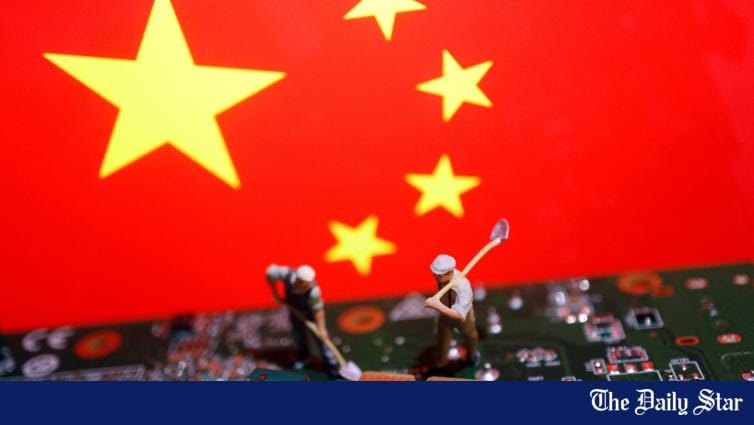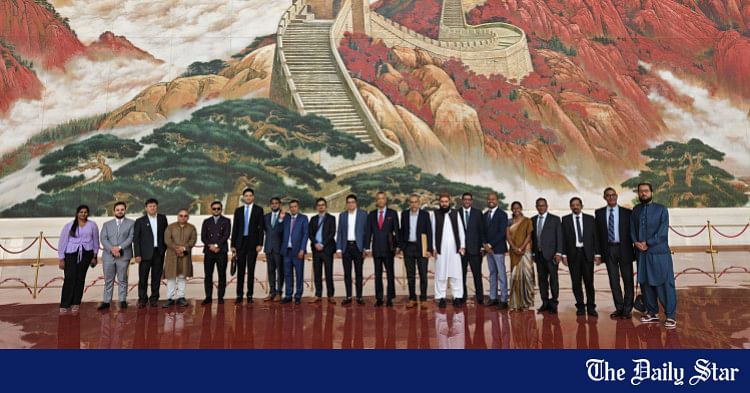Saif
Senior Member
- Joined
- Jan 24, 2024
- Messages
- 16,447
- Likes
- 8,111
- Nation

- Residence

- Axis Group


A new era in China-Africa cooperation
AS THE 2024 Summit of the Forum on China-Africa Cooperation approaches, the stage is set for a new chapter in Sino-African relations. From September 4 to 6, Beijing will host this pivotal gathering, where strategic partnerships between China and Africa are expected to deepen significantly. For...
 www.newagebd.net
www.newagebd.net
A new era in China-Africa cooperation
Imran Khalid 01 September, 2024, 00:00

A motorist rides past a sign of the Forum on China-Africa Cooperation, scheduled to be held in September 4-6, in Beijing on August 30. | Agence France-Presse/Adek Berry
AS THE 2024 Summit of the Forum on China-Africa Cooperation approaches, the stage is set for a new chapter in Sino-African relations. From September 4 to 6, Beijing will host this pivotal gathering, where strategic partnerships between China and Africa are expected to deepen significantly. For China, this summit is more than a diplomatic event. It is a commitment to fostering long-term relationships that promote shared prosperity and address global challenges.
Observers across the African continent view this summit as a crucial opportunity to tackle significant issues, particularly the continent’s infrastructure funding gap, estimated by the African Development Bank to range between $130 billion and $170 billion annually. As Africa’s largest trading partner, China sees this partnership as essential not only for mutual benefits but also for the broader goal of sustainable development.
The summit will likely prioritise cooperation in education, infrastructure, healthcare and technology where collaboration can drive growth and innovation. African nations are keenly awaiting concrete commitments and actionable plans that translate into real progress. The outcomes of this summit could well shape the trajectory of Sino-African relations for years to come.
The Forum on China-Africa Cooperation, established in Beijing in October 2000, marked a moment in the relationship between China and Africa. Over the years, the forum has evolved into the bedrock of a lasting partnership, celebrated for its emphasis on practical, results-driven collaboration. From China’s perspective, this framework is a testament to its commitment to Africa’s sustainable development, focusing on infrastructure, human resource development and governance exchanges.
China’s journey over the past seven decades, characterised by innovation and progressive reforms, has not gone unnoticed by Africa. This model has increasingly resonated with global south countries, which see in China’s experience a roadmap for their own development. For China, the forum is not just diplomacy. It is a strategic alliance that reflects a mutual aspiration for progress. By fostering innovation and tailoring development strategies to unique contexts, this partnership offers a vision for a more interconnected and prosperous future.
China’s growing confidence on the global stage is deeply intertwined with its foreign policy objectives, particularly in fostering stronger ties with the global south. At the heart of this effort is the Forum on China-Africa Cooperation, a platform designed to elevate the traditional bond between Africa and China into a comprehensive, mutually beneficial partnership. Since its establishment, the forum has been instrumental in transforming rhetoric into action, delivering tangible benefits that resonate across both regions.
Between 2000 and 2023, Chinese lenders extended 1,306 loans worth $182.28 billion to 49 African governments and seven regional borrowers. Notably, 2023 saw a resurgence in Chinese lending with 13 new commitments totalling $4.61 billion across eight countries and two regional financial institutions. This marks the first increase in annual loan amounts to Africa since 2016 although it remains significantly below the high-water mark of the early Belt and Road Initiative years, when annual commitments exceeded $10 billion.
As China recalibrates its financial engagement with Africa, this uptick reflects a cautious revival of its investment strategy, signalling a strategic adjustment amid evolving global economic conditions. This strategic approach not only cements China’s role as a pivotal player in global development but also paves the way for deeper cooperation in the future.
In his 2021 FOCAC address in Dakar, Chinese president Xi Jinping charted a bold new course for China-Africa relations, resonating deeply with African leaders and citizens alike. His speech unveiled an ambitious blueprint for future collaboration, signaling China’s unwavering commitment to strengthening ties between the two regions. The Dakar conference resulted in a robust economic cooperation plan, skillfully attuned to the evolving dynamics of the global economy.
At the heart of this initiative lies the ‘China and Africa Vision 2035’, a strategic framework designed to bolster bilateral cooperation across key sectors. This vision prioritises health, poverty alleviation, agriculture, trade, digital innovation, green development, capacity building, cultural exchanges and peace and security.
Since the Dakar summit, notable progress has been made in these areas, with continued momentum expected as the forum’s agenda advances in Beijing. The Vision 2035 plan not only underscores China’s dedication to a mutually beneficial partnership but also reflects a broader strategy to navigate global economic shifts while promoting sustainable development.
Since the launch of the Belt and Road Initiative in 2013, Africa has reaped substantial benefits, largely driven by the active participation of Chinese private enterprises. These companies have emerged as pivotal players in forging a China-Africa community with a shared future, injecting much-needed momentum into the continent’s development. China’s strategy centres on infrastructure development, capital infusion and deploying skilled labor to dismantle growth barriers for African nations.
The impact is undeniable. In the past decade, China has enabled the construction of more than 6,000 kilometres of railways, 6,000 kilometres of road and nearly 20 ports across Africa. Landmark projects such as Kenya’s Standard Gauge Railway and the Addis Ababa-Djibouti Railway have not only enhanced Africa’s economic potential but also significantly strengthened regional connectivity, positioning the continent for sustained growth in the years to come.
As African nations convene for the forthcoming summit, the trajectory of the China-Africa partnership warrants thoughtful reflection. The Forum on China-Africa Cooperation has long served as the cornerstone of this relationship, providing a critical platform for policy alignment and joint initiatives. Meeting every three years, the forum has consistently delivered on substantial financial commitments, highlighted by a $40 billion pledge at the 2021 summit, aimed at bolstering infrastructure, agriculture, and manufacturing across Africa. The forum’s effectiveness is undeniable, with $155 billion of the $191 billion in promised loans implemented between 2006 and 2021.
Yet, this year’s summit unfolds in a challenging global landscape, marked by rising resistance to China from a US-led coalition. At the same time, Chinese companies have significantly impacted Africa’s energy sector, installing over 25GW of generation capacity, which represents more than 15 per cent of sub-Saharan Africa’s total. These investments have bolstered the region’s power infrastructure. This performance underscores the complexity of integrating large-scale Chinese energy projects into diverse African markets, highlighting both the substantial contributions.
In China’s grand global strategy, Africa’s economic value is evident, but its geopolitical importance is rapidly increasing. As Beijing strengthens economic ties with the continent, it simultaneously secures vital support in international forums, enhancing China’s ability to influence global diplomacy and security. This backing is crucial as China aims to challenge and redefine a world order it views as biased.
The 2024 summit, themed ‘Joining Hands to Advance Modernisation and Build a High-Level China-Africa Community with a Shared Future’, is poised to deepen these connections. This approach aligns with China’s broader geopolitical ambitions, potentially ushering in a new era of cooperation. If executed effectively, FOCAC could foster a sustainable and mutually beneficial partnership, reinforcing China’s strategic positioning on the global stage.
Imran Khalid 01 September, 2024, 00:00
A motorist rides past a sign of the Forum on China-Africa Cooperation, scheduled to be held in September 4-6, in Beijing on August 30. | Agence France-Presse/Adek Berry
AS THE 2024 Summit of the Forum on China-Africa Cooperation approaches, the stage is set for a new chapter in Sino-African relations. From September 4 to 6, Beijing will host this pivotal gathering, where strategic partnerships between China and Africa are expected to deepen significantly. For China, this summit is more than a diplomatic event. It is a commitment to fostering long-term relationships that promote shared prosperity and address global challenges.
Observers across the African continent view this summit as a crucial opportunity to tackle significant issues, particularly the continent’s infrastructure funding gap, estimated by the African Development Bank to range between $130 billion and $170 billion annually. As Africa’s largest trading partner, China sees this partnership as essential not only for mutual benefits but also for the broader goal of sustainable development.
The summit will likely prioritise cooperation in education, infrastructure, healthcare and technology where collaboration can drive growth and innovation. African nations are keenly awaiting concrete commitments and actionable plans that translate into real progress. The outcomes of this summit could well shape the trajectory of Sino-African relations for years to come.
The Forum on China-Africa Cooperation, established in Beijing in October 2000, marked a moment in the relationship between China and Africa. Over the years, the forum has evolved into the bedrock of a lasting partnership, celebrated for its emphasis on practical, results-driven collaboration. From China’s perspective, this framework is a testament to its commitment to Africa’s sustainable development, focusing on infrastructure, human resource development and governance exchanges.
China’s journey over the past seven decades, characterised by innovation and progressive reforms, has not gone unnoticed by Africa. This model has increasingly resonated with global south countries, which see in China’s experience a roadmap for their own development. For China, the forum is not just diplomacy. It is a strategic alliance that reflects a mutual aspiration for progress. By fostering innovation and tailoring development strategies to unique contexts, this partnership offers a vision for a more interconnected and prosperous future.
China’s growing confidence on the global stage is deeply intertwined with its foreign policy objectives, particularly in fostering stronger ties with the global south. At the heart of this effort is the Forum on China-Africa Cooperation, a platform designed to elevate the traditional bond between Africa and China into a comprehensive, mutually beneficial partnership. Since its establishment, the forum has been instrumental in transforming rhetoric into action, delivering tangible benefits that resonate across both regions.
Between 2000 and 2023, Chinese lenders extended 1,306 loans worth $182.28 billion to 49 African governments and seven regional borrowers. Notably, 2023 saw a resurgence in Chinese lending with 13 new commitments totalling $4.61 billion across eight countries and two regional financial institutions. This marks the first increase in annual loan amounts to Africa since 2016 although it remains significantly below the high-water mark of the early Belt and Road Initiative years, when annual commitments exceeded $10 billion.
As China recalibrates its financial engagement with Africa, this uptick reflects a cautious revival of its investment strategy, signalling a strategic adjustment amid evolving global economic conditions. This strategic approach not only cements China’s role as a pivotal player in global development but also paves the way for deeper cooperation in the future.
In his 2021 FOCAC address in Dakar, Chinese president Xi Jinping charted a bold new course for China-Africa relations, resonating deeply with African leaders and citizens alike. His speech unveiled an ambitious blueprint for future collaboration, signaling China’s unwavering commitment to strengthening ties between the two regions. The Dakar conference resulted in a robust economic cooperation plan, skillfully attuned to the evolving dynamics of the global economy.
At the heart of this initiative lies the ‘China and Africa Vision 2035’, a strategic framework designed to bolster bilateral cooperation across key sectors. This vision prioritises health, poverty alleviation, agriculture, trade, digital innovation, green development, capacity building, cultural exchanges and peace and security.
Since the Dakar summit, notable progress has been made in these areas, with continued momentum expected as the forum’s agenda advances in Beijing. The Vision 2035 plan not only underscores China’s dedication to a mutually beneficial partnership but also reflects a broader strategy to navigate global economic shifts while promoting sustainable development.
Since the launch of the Belt and Road Initiative in 2013, Africa has reaped substantial benefits, largely driven by the active participation of Chinese private enterprises. These companies have emerged as pivotal players in forging a China-Africa community with a shared future, injecting much-needed momentum into the continent’s development. China’s strategy centres on infrastructure development, capital infusion and deploying skilled labor to dismantle growth barriers for African nations.
The impact is undeniable. In the past decade, China has enabled the construction of more than 6,000 kilometres of railways, 6,000 kilometres of road and nearly 20 ports across Africa. Landmark projects such as Kenya’s Standard Gauge Railway and the Addis Ababa-Djibouti Railway have not only enhanced Africa’s economic potential but also significantly strengthened regional connectivity, positioning the continent for sustained growth in the years to come.
As African nations convene for the forthcoming summit, the trajectory of the China-Africa partnership warrants thoughtful reflection. The Forum on China-Africa Cooperation has long served as the cornerstone of this relationship, providing a critical platform for policy alignment and joint initiatives. Meeting every three years, the forum has consistently delivered on substantial financial commitments, highlighted by a $40 billion pledge at the 2021 summit, aimed at bolstering infrastructure, agriculture, and manufacturing across Africa. The forum’s effectiveness is undeniable, with $155 billion of the $191 billion in promised loans implemented between 2006 and 2021.
Yet, this year’s summit unfolds in a challenging global landscape, marked by rising resistance to China from a US-led coalition. At the same time, Chinese companies have significantly impacted Africa’s energy sector, installing over 25GW of generation capacity, which represents more than 15 per cent of sub-Saharan Africa’s total. These investments have bolstered the region’s power infrastructure. This performance underscores the complexity of integrating large-scale Chinese energy projects into diverse African markets, highlighting both the substantial contributions.
In China’s grand global strategy, Africa’s economic value is evident, but its geopolitical importance is rapidly increasing. As Beijing strengthens economic ties with the continent, it simultaneously secures vital support in international forums, enhancing China’s ability to influence global diplomacy and security. This backing is crucial as China aims to challenge and redefine a world order it views as biased.
The 2024 summit, themed ‘Joining Hands to Advance Modernisation and Build a High-Level China-Africa Community with a Shared Future’, is poised to deepen these connections. This approach aligns with China’s broader geopolitical ambitions, potentially ushering in a new era of cooperation. If executed effectively, FOCAC could foster a sustainable and mutually beneficial partnership, reinforcing China’s strategic positioning on the global stage.















































